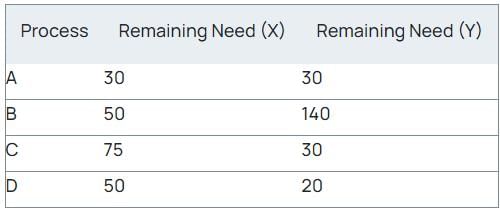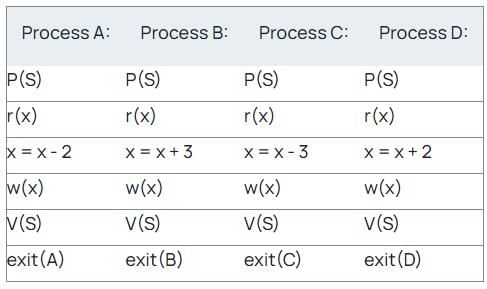Test: Operating System - 1 - Computer Science Engineering (CSE) MCQ
10 Questions MCQ Test - Test: Operating System - 1
Consider a system having 20 resources of same type. These resources are shared by 4 process which have peak demands of 4, 5, x, y respectively. What is the maximum value of x + y to ensure that there will be no deadlock in the system?
At time 0, an OS with round-robin scheduling (time quantum = 5 units) has 5 processes P1, P2, P3, P4, P5 with burst times 15, 10, 20, 5, 15 respectively. What is the average turn-around time?
Consider the following scenario: A, B, C, D are processes and X, Y are resources used by the processes.

If Resources available: [X: 40 Y: 40] then what will be a safe sequence so that the processes complete execution without deadlock?

Which of the following is/are not true about the deadlock scheme?
I. In deadlock avoidance, number the resource uniquely and never requests a lower-numbered resource
II. In deadlock avoidance, the request for the resources is always granted if the resulting state is safe.
III. In deadlock prevention, never request a resource after releasing any resource.
Consider a shared variable with initial value 10, this shared variable is used by four concurrent processes A, B, C and D. Process A reads the shared variable and decrements it by two and process B reads the shared variable and increment it by three before writing it to the memory. Process C reads the shared variable and decrement it by three while process D reads the shared variable and increment it by two before writing it to the memory. All the process before reading the value performs the wait operation on a counting semaphore variable S and after writing it to the memory, a signal operation is performed before the processes get terminated. Find the minimum possible value of the shared variable in the memory if S is 2?
Consider a counting semaphore S. The operation P(S) performs the operation S = S – 1 and operation V(S) performs the operation V = V + 1. During program execution, 13P and 5V operation is performed in the some order. Find the number of processes in a blocked state with initial counting semaphore value 1.
Consider six memory partitions of size 250KB, 470KB, 600 KB, 500 KB, 300KB, and 410 KB where KB refers to kilobyte. These partitions need to be allotted to four processes of sizes 350 KB, 200 KB , 468 KB and 480 KB in that order. Which partitions are not allotted to any process when we use best fit and worst fit algorithm?
A computer uses 48 bits Virtual Address Space, 256 GB of physical memory with page size of 4 KB. The page table size is 4 bytes and if each entry fits in a single page the number of levels of paging required is _____.
demand - paging uses a TLB (Translation Look - aside Buffer) and single level page table stored in main memory. The memory access time is 5 μs and the page fault service time is 25 ms. If 70% of access is in TLB with no page fault and of the remaining, 20% is not present in main memory. The effective memory access time in ms is _________. (Write answer up to two decimal places)
Which of the following is/are TRUE about user-level threads and kernel-level threads?




















